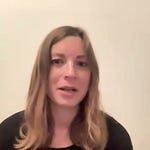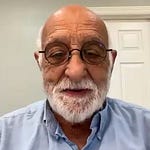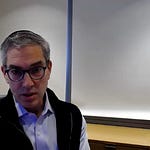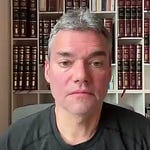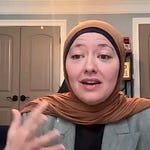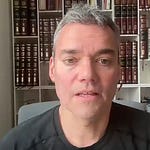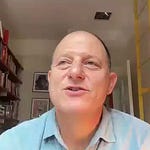Our Zoom call this week will be at a Special Time: 1 PM Eastern.
Our guests will be two professors— one Palestinian and Jewish— with deep insights into the protests on their campus: The first is Rashid Khalidi, the Edward Said Professor of Modern Arab Studies at Columbia who gave this blistering speech about the university’s crackdown on pro-Palestine protesters. The second is David Myers, the Sady and Ludwig Kahn Chair in Jewish History at UCLA, who was present during the attack on UCLA’s encampment, and wrote about his experience.
Paid subscribers will get the link this Monday and the video the following week. They’ll also gain access to our library of past Zoom interviews with guests like Thomas Friedman, Ilhan Omar, Benny Morris, Noam Chomsky, and Bret Stephens.
Sources Cited in this Video
Correction: When comparing Zionist Jewish students on campus to Israel’s position in the Middle East, I mistakenly referred Israel being “popular” in its region. I meant to say “unpopular.”
The attacks on Pro-Palestine protesters at UCLA and Columbia.
Edward Said’s vision for Palestine and Israel: “There can be no reconciliation unless both peoples, two communities of suffering, resolve that their existence is a secular fact, and that it has to be dealt with as such. This does not mean a diminishing of Jewish life as Jewish life or a surrendering of Palestinian Arab aspirations and political existence. On the contrary, it means self-determination for both peoples.”
Things to Read
(Maybe this should be obvious, but I link to articles and videos I find provocative and significant, not necessarily ones I entirely agree with.)
On the Jewish Currents (subscribe!) podcast, Adam Haber and Matylda Figlerowicz write about the “moral panic” fueling repression on campus.
A recent guest, Dr. Musallam Abu Khalil, runs a charity that promotes the health and wellness of people in Gaza’s Nusierat Refugee Camp. Please consider supporting it.
Norman Finkelstein’s address to the encampment at Columbia.
A Jewish student writes about the protests and antisemitism at Northeastern.
In April, I spoke about Zionism and American Jews at Brown University.
Last week, I spoke about the protests on Slate’s “What Next” podcast and with Ali Velshi and Nick Kristoff on MSNBC.
Check out Waleed Shahid’s new newsletter.
In the Ideas Letter, Daniel Levy, Mark Mazower, and Chris Ngwodo write about the global implications of the Gaza War.
On May 6 I’ll be moderating a panel entitled, “How to Report on Liars and Haters” at CUNY’s Newmark School of Journalism.
I’ll be speaking on May 8 at Whitman College.
See you on Friday at 1,
Peter
VIDEO TRANSCRIPT:
Hi. I wanted to talk about what’s happening on college campuses, and to make six different observations. And these come from my travels speaking at colleges this semester. I’ve probably spoken at at least a dozen, maybe fifteen, I’m not sure. And I also spent a lot of time at Columbia, in particular, several days before the encampment was taken down. Now, the colleges I’ve been to, I should say, are not representative. They’re more of the kind of elite kind of campuses that have been disproportionately in the news. So, it’s important to say that not everything I’m saying is gonna hold for all campuses in America. And probably the media should be paying a lot more attention to some of these campuses that don’t have such fancy names and to see what’s actually happening there. So, what I’m going to say is not necessarily representative of campuses as a whole, but they may be representative of the ones that have been in the news a lot.
The first is that the most important political dynamic is not happening among either Jewish or Palestinian students. It’s happening among non-Jewish progressive and non-Palestinian progressive students, and most of these students are progressive. And what’s happening is that for a lot of these students, the question of Palestinian liberation has become a central part of their political identity when it wasn’t before. It wasn’t that they were hostile to Palestinian freedom. If they thought about it, they probably would have been sympathetic, but it wasn’t one of their top burning issues. Now it’s become a central part of their political identity.
One way of thinking about this is that a large number of the progressive students on these campuses have moved from being non-Zionists to being anti-Zionists. They weren’t supporters of Israel before, but they weren’t involved in activism against Israel either, and now they are. And the reason this matters so much is that these campuses don’t have many conservative students, right? They don’t have, for instance, a lot of conservative Christian white evangelical students. So, the dynamics on the campus are very different than the dynamics in the country as a whole. In the country as a whole, most Zionists in America are not Jewish. You have huge numbers of Christian Zionists out there in Congress, out there in the country, in the Republican Party. But in these campuses, once the progressive students turn to being anti-Zionists, pretty much the only Zionist people around are the Jewish students. Yes, they could be joined by the college Republicans. But there are not many college Republicans. And I think this is what creates this dynamic of ideological isolation among the Zionist Jewish students, as they see the large bulk of their classmates who are not Palestinian but have turned towards a pro-Palestine politics.
It’s not that the Zionist Jewish students don’t have allies. They have powerful allies. But the allies are not on campus. Their allies are the politicians in Congress, the national Jewish organizations, to some degree you could even say big elements of the mainstream media, the donors. But those forces are very unpopular on the campus itself. And so, in some ways their de facto alliance with those off-campus powers also contributes, I think, to their social isolation. In some ways, the position of the Jewish Zionist students is a little bit like the situation that Israel used to be in the Middle East, where it was very unpopular in its local region, but had very powerful allies externally in the West. And that’s the kind of situation that I think Zionist Jewish students find themselves in, which is very uncomfortable.
The second point I want to make is that the media sometimes depicts these students who are protesting as these kinds of coddled, privileged students, and compares them to the coddled, privileged students who tried to get out of the draft during Vietnam. I think that really gets a lot wrong. In my experience, the students who are most likely to be involved in the pro-Palestine activism are among the least privileged students on campus. They are disproportionately students of color, and many of them are from immigrant families, and a significant number of them are actually foreign students. And these are students who, again, because they’re people of color, are disproportionately more likely to identify with the Palestinian cause because they see things in their own family histories that they connect to the Palestinian struggle and the lack of Palestinian freedom. But these are not particularly privileged students. In fact, they’re often very vulnerable students, some of the most vulnerable students on campus. I was talking at Columbia to a young woman—a foreign student—who was saying that her parents were desperately asking her not to be involved in the protest because if you are a foreign student, and you get arrested, you can be deported. And she told me that she told her parents, I’m sorry I’m gonna take that risk because I’m following in your footsteps, and you were doing this kind of activism back in South Asia.
This is very different than the anti-Vietnam war protest. The campuses were much more white and male. And remember, one of the big reasons for the protests were the students’ fear of getting drafted and having to fight. So, their activism was a form of material self-interest: we want to end the war so we won’t get drafted. The war continuing was a threat to them. In this case, it’s quite the reverse. It’s actually the war itself doesn’t create a material threat to these students, but they are taking actions anyway—you could in some ways say against their material self-interest, putting themselves at some degree of risk because of their ideological connection to the Palestinian cause. I also think this is one reason you may not see as much backlash as you did during the Vietnam War. Remember, during the Vietnam War, the policemen who were arresting these students were from working-class families, and they had brothers who were fighting in Vietnam, which gave them a particular antipathy to these white male, more privileged college students who were avoiding the draft. You don’t have that dynamic here, which I think may explain why there’s less of a political backlash against this protest.
Thirdly, in terms of what’s happening with the Jewish students, mainstream American Jewish organizations don’t want to acknowledge this, and even the media doesn’t often acknowledge it, but there is on a lot of these campuses a kind of intra-Jewish ideological civil war. A very, very large percentage of the majority of Jews around the world are Zionists, support a Jewish state. And even in the United States as a whole, probably 80% of American Jews support the Jewish state. But there’s of such a sharp generational divide that when you look at young people, especially on these progressive campuses, it’s not 80% that would consider themselves Zionist. It may be more like 60%, or 65%, maybe 70. But, certainly, a lower percentage. So, you have a minority of Jews who were anti-Zionist or questioning Zionism. It’s a minority, but it’s a significant minority. It’s not a tiny minority. I was told at two campuses that while a majority of the people in the protest movement are people of color—and of course there are Jews of color as well—that the majority of the white people in the protest movement were themselves Jews. And so, it’s interesting to think about how this intra-Jewish ideological civil war that’s going to define this debate of American Jews, I think, for the next half century, how it plays that out. Who are the Jews who are more likely to be anti-Zionists? The young Jews. And who are the ones who are most likely to be Zionists?
The Zionist Jewish students, I think, in my mind, come in three buckets. The first is they’re much more likely to be Orthodox because the Orthodox community is much more pro-Israel and it’s also mostly voting Republican now. So, those students are very likely to be disproportionately in the pro-Israel camp. The second group are Jewish students whose parents were not born in the United States. It’s not surprising to me that two of the activists who are becoming more prominent, for instance, at Columbia and Yale are both the children of Persian Jewish immigrants. Jewish kids whose parents are Russian or Brazilian or Persian—I met a couple of Brazilian very Zionist Jewish students—these are more Zionist communities, and these are families that have more of a sense of the fragility of diaspora Jewish life than an American Jewish family that’s been in America for a hundred years. And so, those students are also likely to be disproportionately pro-Israel and even pro-Israel activists.
The third bulk is Jewish students who are in fraternities and sororities. Now, that might seem a little strange. But I think one of the things about politics in this younger generation is that gender identity plays a very important role that’s different than in older generations. Remember, the percentage of kids on these campuses who identify themselves as LGBTQ could be double the percentage that you see in older generations. And so, the kids who are in fraternities and sororities are often the ones who most identify with traditional gender roles, whereas the students who are LGBTQ are much more likely to be found in all manner of leftist movements, including the pro-Palestine movements. And that plays out among Jews as well, which is why I think you tend to find a more pro-Israel sentiment in these Jewish fraternities and sororities.
So, this is a real struggle between Jewish students. And I think one of the first things that frustrates me a lot is that there’s this language often about keep keeping Jewish students safe. And, in the name of keeping Jewish students safe, you know, the ADL and others call for, you know, suspending pro-Palestine groups, or shutting down encampments, or whatever. But very frequently among the people that they want to penalize are Jewish students itself. So, they’re not really looking out for the safety of all Jewish students. They’re really looking out for the safety of Zionist students. And they don’t really care very much about the safety of the anti-Zionist students because they’re often the ones who get suspended, and arrested, and have their groups shut down.
Connected to that is that the language of safety is applied so radically differently when it comes to Zionist Jewish students and when it comes to Palestinian or Arab or Muslim students. So, first of all, in terms of the kind of the idea that you were made uncomfortable or threatened by speech, we’re always being told to imagine what it feels like for a Jewish student to hear a phrase like ‘Palestine will be free from the river to the sea,’ which they may interpret as saying the Jews need to leave. And it could be that that’s meant that way. And again, it’s open to interpretation. Or that they may be threatened by the phrase ‘globalize the intifada,’ which they could interpret as a call for an attack or violence even against them.
But we’re rarely asked to imagine what it’s like for a Palestinian student, for instance, to hear a phrase like, ‘Israel has the right to defend itself,’ ‘I stand with the IDF,’ right? If you are a Palestinian student who has had family killed in Gaza, and you hear an endorsement of that war, that could be at least as threatening a kind of language to you as the phrase ‘Palestine will be from the river to sea’ is for a Jewish student. And yet, I find so rarely we are asked to put ourselves in the place of those Palestinians students. To be clear, I think all of that speech should be permitted. But if we’re going to talk about the way that the words can harm people, or make people uncomfortable, we should try to be even handed about it. And when we talk about actual violence, which of course should never be allowed on a college campus, what’s odd to me about that is that it seems to me that the clearest acts of violence, most egregious acts of violence that we’re seeing are mostly coming against Palestinian and pro-Palestinian students. For instance, there was this attack on the pro-Palestine encampment at UCLA by people who seem to come from the local Jewish community. And there was this skunk water attack by Jewish students at Columbia on these pro-Palestine students, which sent some of them to the hospital.
Now, just imagine for a moment what the media coverage would have been like if you would have had people from a local Arab, Palestinian, or Muslim community who would have come on campus and physically attacked a group of Zionist Jewish students. Or if you had a Palestinian or Arab or Muslim student who would use skunk water and sent a whole bunch of Zionists Jewish students to the hospital. I think those cases would be much, much bigger news than they are now. And I think the reason they’re not has to do with the way in which we take violence more seriously when it comes against Jewish students than we do when it comes against Palestinian or pro-Palestinian students. And we kind of tend to often filter out the kind of even physical threats that pro-Palestinian or Palestinian students face. Again, this of course is not to suggest that violence should be tolerated against anybody, or harassment. Of course not. But the point is, again, we should try, it seems to me, to have a high bar for the physical safety of all students, and often times I feel like that’s lacking.
The fourth point I wanted to make is that I think there is a struggle in these universities between the liberal arts parts of the universities, the kind of college, and some of the professional schools. If you look at the letters that were signed, the kind of pro-Palestine and pro-Israel letters signed by faculty, what you notice is the pro-Palestine letters are overwhelmingly coming from people in the undergraduate departments, especially the humanities departments. And the people who are signing the pro-Israel letters are much more likely to come from professional schools: medical school, business school, in particular, along with some scientists. And I think that’s because the ideological climate in the professional schools can be quite different than it is in the liberal arts colleges. This is one of the reasons that the most, I think, left-wing universities on the question of Israel-Palestine tend to be liberal arts colleges that have no graduate schools. Also, because those schools tend to have almost no Orthodox Jewish students because Orthodox students don’t really go to liberal arts colleges because there’s not enough of an infrastructure for the religious needs that they have.
But the most combustible campuses—I think, Columbia, Penn, UCLA—they have a particular thing in common. Which is they have a left-leaning undergrad, kind of liberal arts campus culture, plus powerful professional schools, and a significant number of Orthodox Jewish students who tend to lean very pro-Israel. And you see a kind of clash between the undergraduate part, which leans to the left, and the business schools in particular, which tend to be the only parts of campus that are really right-leaning in the sense that they’re very pro-capitalist. So, at Penn, I think it’s not a coincidence that Marc Rowan, who was the key figure in helping to push out Penn’s president, was the chair of the board of Wharton, of the business school; that the most high-profile pro-Israel professor at Columbia right now, Shai Davidai, is a professor at Columbia Business School; that you have a kind of cultural clash, ideological clash between different aspects of the universities that have very different kinds of faculty.
The last point I wanted to make has to do with a particular kind of discourse that I’ve heard among the protesters. And I was at Columbia for many, many, many hours. And I had this kind of really disorienting experience. And the experience was I had a long conversation with a Jewish student, very impressive Jewish student who had been involved in the encampment, and really talked about how wonderful it was, and how completely embraced he felt. And also, on our last week’s call, I had one of the people we interviewed was Ilan Cohen, who’s another Jewish student at Columbia, also very involved in the encampments, also felt completely fully embraced. The Columbia encampment had a seder, as people may know, it had Shabbat services. So, these Jewish students who were intimately involved in it felt no antisemitism whatsoever, quite the opposite.
And yet, after the conversation I had with this Jewish student, I saw the students from the encampment, some of them, come to the gates of Columbia and Amsterdam. So, these were the students in the encampment. These were not outside people. And they started doing a series of chants. Many, many chants. But one of those chants was, ‘settlers, settlers go home, Palestine is ours alone.’ And if you understand the context of these chants, the many, many chants, it’s clear this is not a reference to West Bank settlers. This is a reference to settlers as just Israeli Jews, as settlers in general. And I was really struggling to understand how I could have both heard from the Jewish students that they felt so at home there, and then hearing a chant, which seemed to me, you know, to basically be calling for Israeli Jews to leave. I mean, what’s amazing about that is it’s actually more radical than what Hamas has said. And if you look at Hamas’ 2017 charter, it’s most recent charter, Hamas does not say in that charter the Israeli Jews need to leave, right? So, these students are actually taking a position which is more radical even than the ideological position of the current Hamas charter. And yet, these Jewish students were saying they didn’t feel any antisemitism.
And so, I guess my way of trying to understand this is that I think antisemitism in some ways isn’t the right word to understand what’s going on. I genuinely think that these protest movements are totally willing to embrace Jews who embrace the anti-Zionist cause. But alongside that, I think there is a kind of dehumanizing language when it comes to Israeli Jews, a kind of Manichean worldview that basically sees the world as oppressors and oppressed, and sees Israeli Jews—all of them—as the oppressors, as colonists, and therefore just doesn’t have any space for their humanity, for their dignity, for their lives. And you also see this in the real difficulty that these student protesters so often have in condemning what happened on October 7th. There are, by the way, very honorable exceptions. Northeastern, for instance. Their protest move did make a clear statement about the opposition to targeting civilians. But I think many others in these activist movements have not.
And so, what was so saddening to me about this was that this was happening on the campus of Edward Said. And now the campus of Rashid Khalidi. These are some of the most important Palestinian intellectuals that have existed in the United States. And that rhetoric about ‘Israeli Jews go home, Palestine is ours alone,’ is so far from Said’s vision, and so far from Khalidi’s vision, which really were about mutual liberation, about full equality and coexistence. Said was strongly anti-Zionist, of course. And yet, he always had a kind of generosity of spirit towards the idea that this should be a place that Israeli Jews could continue to live, again, not under a Jewish supremacy but under conditions of equality. And I so wish that I heard more of that spirit from at least the protesters that I was listening to at Columbia.
Again, I’m not saying this because I want those students, their speech to be suppressed or want them to be arrested. Not at all. And indeed, as I said in last week’s video, I think that there are really, really important things that are coming out of this protest movement. They are putting debates on the table about university complicity with the oppression of Palestinians that are really, really important. All next fall, we’re going to start having debates over divestment because some of these universities have been forced to have these debates in their boards of trustees. That’s a tremendous accomplishment by this movement. And yet, I just wish it were not paired with a discourse that, whether you call it antisemitic or not, seems to me just not to hold a lot of space in its heart for the humanity of Israeli Jews—regardless of the system of oppression that they benefit from, and I consider it a system of profound oppression—are still human beings who seem to me whose lives should be cared about, and should be invited and welcomed to live in this place in equality and safety alongside Palestinians.

